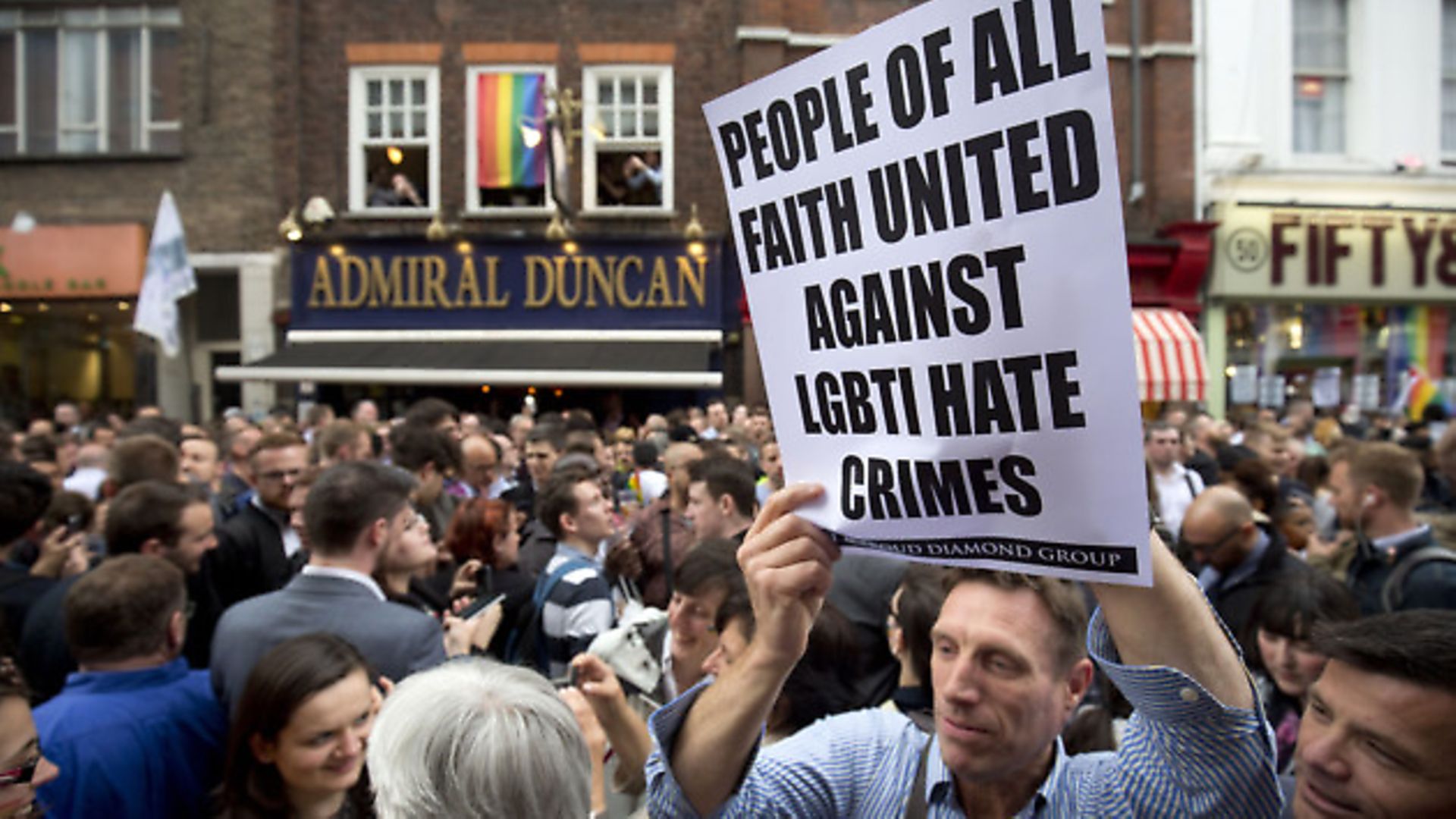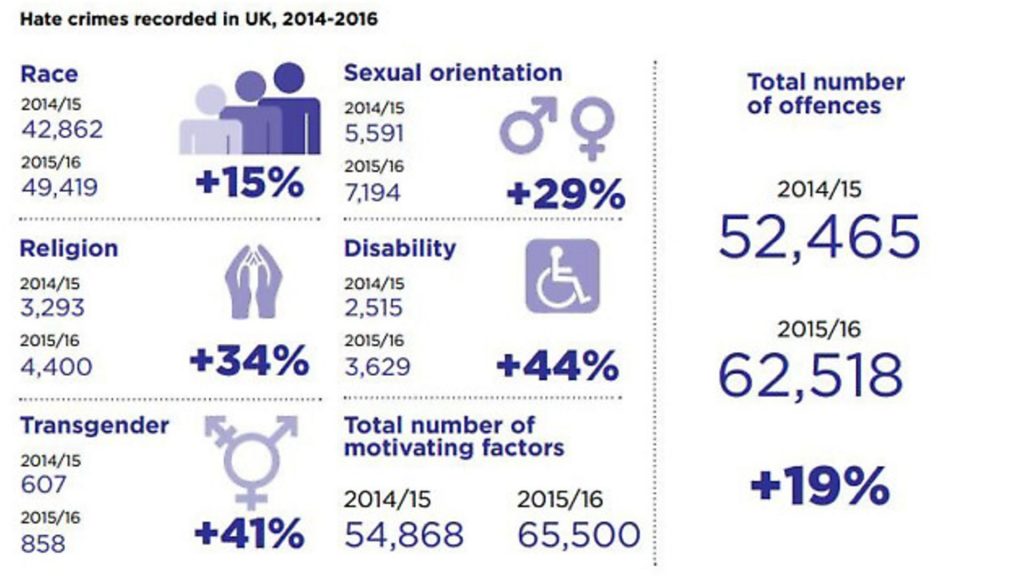
It is the issue that is every bit as toxic as Brexit itself – has Britain become more hateful since the referendum?

When it comes to suggestions about hate crime, Brexit and a possible correlation, there’s not much which isn’t contested. But one detail is beyond dispute: since the referendum, record levels of hate offences have been reported to police.
Recently released figures reveal that in some areas, in the three months directly after the vote to leave the EU, reports of racist, homophobic and related crimes more than doubled. And in three of the UK’s major metropolitan areas – London, Manchester and West Yorkshire – recorded increases of more than 1,000 individual reports were observed.
But exactly what these figures represent is still very much under debate. For some, it is incontrovertible evidence of a country that has taken a turn for the worse since the referendum. One in which long-suppressed prejudices and hatreds have been unleashed, and bullies unmuzzled. For others, it is a meaningless statistical blip, manufactured by a heightened awareness of hate crimes around the time of the vote, with greater discussion of the issue and encouragements for people to report any concerns.
The split, of course, follows along familiar lines: for Remainers, a rise in hate crime is another symptom of the breakdown of Britain since the vote. For Leavers, it is simply another smear on their character by bitter pro-Europeans trying to explain away their defeat.
The conflation of the issue with the old battles of the referendum itself is, of course, the main reason it is proving so contested. So there are two blindingly obvious, but sadly necessary, early points to be made: not all Brexiteers are racist, sexist or homophobic. But neither are all those who have reported the offences, frail, hypersensitive snowflakes complaining about imagined slights. No one should downplay the impact of the offences, or the sheer numbers involved.
For one thing, though, it is important to stress that the marked rise is for reports, not convictions. For another, police are wary of pinning the cause of the increase squarely on Brexit.
‘Hate wasn’t born the day we had a referendum,’ Assistant Chief Constable Mark Hamilton, the national policing lead for hate crime, told MPs this week.
‘People’s views on these things just didn’t happen that day. You can’t blame any single incident.’
And, as he went on to add, last summer was not short of incident. ‘We also had the murder of a number of people in a nightclub in Miami related to the LGBT community. We also had the Charlie Hebdo issue right through France the previous year. So, there’s been a number of factors that have increased in our community, the awareness of hate crime and the response to them.
‘One, increased awareness, two, people reporting stuff that pre-referendum they wouldn’t have reported because they weren’t aware to do it, or just hadn’t got the courage, and thirdly then, the prevalence of increased actual offending. We think it was a combination of all three.’
So, while it is not a simple case of cause and effect, Brexit is, nevertheless, there in the police analysis of the increase. Claire Light, head of equality at Greater Manchester Police, said the force had monitored hate crimes in the run up to the referendum and the weeks following it.
During the same Home Office Select Committee hearing at which Hamilton spoke, she told MPs there had been some cases that were explicitly linked to Brexit, including one where a complainant had been told ‘I voted for you to leave, now you need to go home’.
She added: ‘We had about five or six during that period where it was really explicit that it was linked to the referendum.’
As recorded offences go, hate crimes are relatively recent invention. The police and the Crown Prosecution Service first agreed a common definition of hate crime ten years ago and started measuring national levels in 2008. And there are certainly some grave concerns over exactly how officers are monitoring and investigating alleged offences – as Kevin O’Sullivan reports opposite.
From the data amassed so far, however, there seems little doubt of spikes linked to major news events. Home Office graphs show how incidents of religious or race crime went up after the murder of soldier Lee Rigby, the Charlie Hebdo shooting and the Paris terror attacks in November 2015. The flaring up of Arab and Israeli tensions is also cited by the Home Office researchers.
Brexit then – with the associated airing of emotional topics like immigration and citizenship – should be no different. But some criminologist think there was something more at play too. Dr Stevie-Jade Hardy, of Leicester University, has suggested that politicians and some elements of the media actually helped to legitimise criminal behaviour in the wake of the vote.
‘Hostility towards ‘difference’ was present before the EU referendum but may have been largely confined to conversations in private spaces. However, the toxic climate surrounding the referendum debate enabled this hostility to surface within political speeches, on front pages of newspapers and in everyday conversations within pubs, in classrooms and on social media platforms.
‘The focus shifted from issues relating to EU membership to the one big issue for Britain: namely, ‘them’. When ordinary people have a political mandate to blame those who are different for society’s ills then the shackles of human decency are stripped away.
‘For some it is now seen as acceptable to target men, women, children and elderly people for being an EU migrant, for being a British-born minority, for being who they are.’
This is certainly the view of the Equality and Human Rights Commission (EHRC) which suggests that, for a small number of people, Brexit has helped ‘legitimise inexcusable racism and prejudice’. And it has been the experience of some on the receiving end, with many foreign-born people reporting experiencing attitudes they had never encountered in the UK before, in the period after the vote.
The EHRC is already warning of the possibility of further spikes in offences once Article 50 is triggered and the Brexit process has officially begun. But it remains likely that your view on the link between Brexit and hate crime will depend on which side of the issue you voted in the first place.









